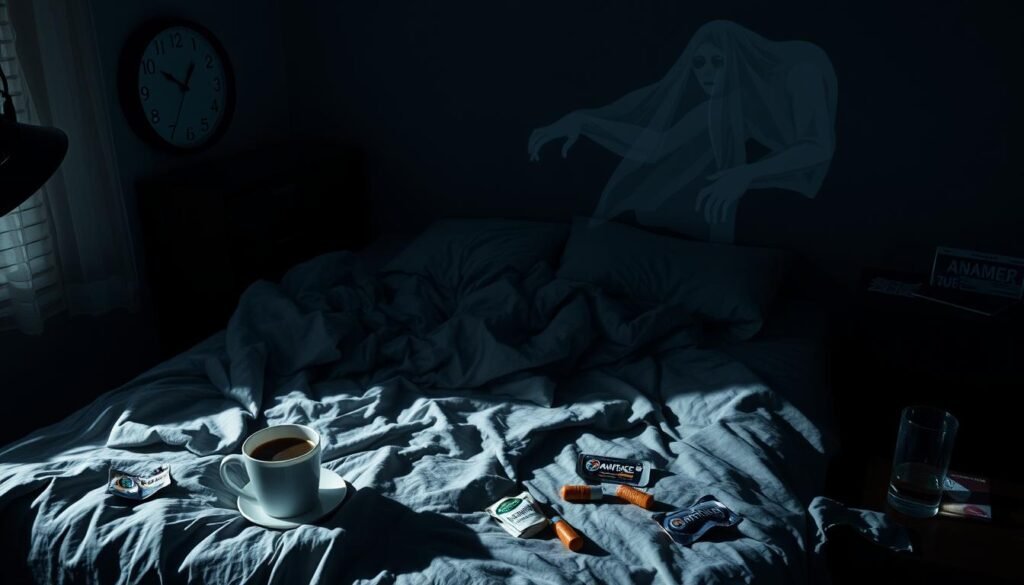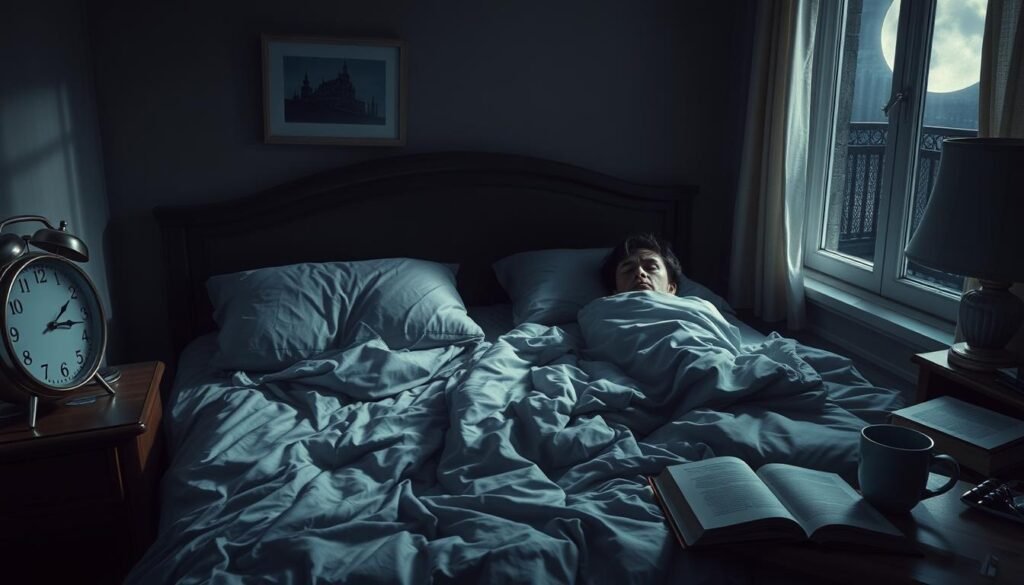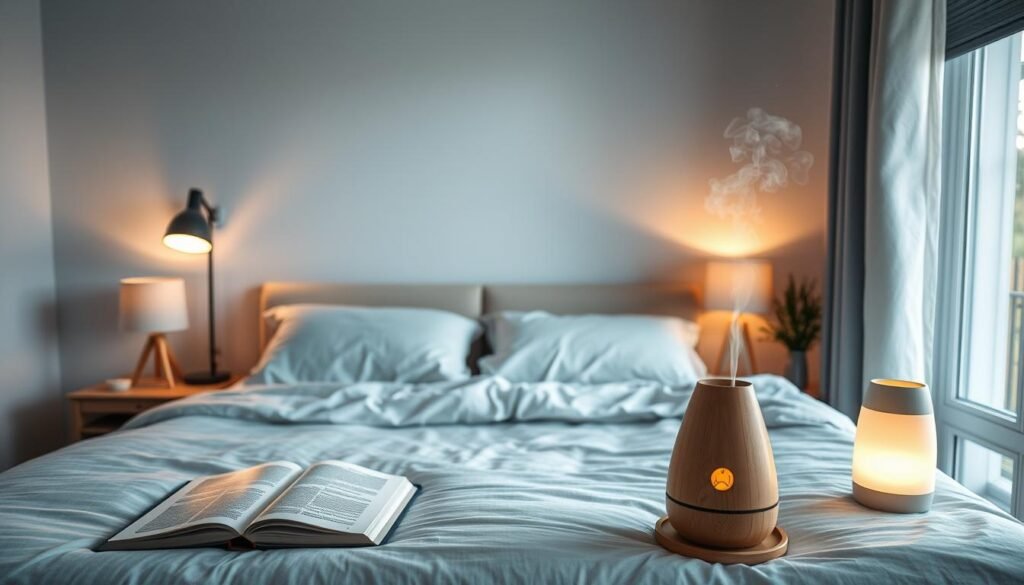Did you know more than 80% of us have trouble falling asleep sometimes? This fact points out a common issue: feeling super tired but not being able to sleep. For a lot of people, not just getting enough sleep is an often issue. It messes with their day-to-day life. Knowing why this happens, what triggers it, and its effects is key. Especially if you’re someone who spends nights just tossing and turning.
Key Takeaways
- Over 80% of people face sleep difficulties at times.
- 37% frequently struggle with falling asleep.
- Relaxation techniques can help address sleep issues.
- Chronic pain can significantly disrupt sleep patterns.
- Jet lag affects the ability to fall asleep due to time zone adjustments.
- Night shift work can lead to increased sleep loss.
Understanding Insomnia and Its Causes
Many people struggle with insomnia, finding it hard to fall or stay asleep. This leads to feeling tired all day. Adults need 7 to 9 hours of sleep, so insomnia is a big problem. It’s important to know what causes insomnia to fix it and sleep better.
What is Insomnia?
Insomnia comes in two types: short-term and chronic. Short-term insomnia lasts a few days to weeks, caused by stress or big life events. Chronic insomnia lasts over three months and happens often. It’s caused by life habits, emotional stress, and other sleep disorders.
Common Triggers of Insomnia
Many things can trigger insomnia, including:
- Environmental disturbances such as noise and light
- Poor sleep hygiene, like irregular sleep schedules and late-night eating
- Substances such as caffeine, nicotine, and alcohol
- Mental health disorders and medications that interfere with sleep
Stress makes it hard to sleep well. Not sleeping enough can make stress worse, creating a tough cycle. Knowing these triggers helps us understand sleep problems better.
How Stress and Anxiety Affect Sleep
Stress and sleep have a complex link. Stress and anxiety make relaxing and sleeping hard. This leads to poor sleep and takes longer to fall asleep. Managing stress well is key to fixing insomnia.
For more tips on handling insomnia, check out more on causes of insomnia and how to treat it.
| Type of Insomnia | Duration | Typical Causes |
|---|---|---|
| Short-term | Days to Weeks | Stress, life changes |
| Chronic | Three Months or More | Poor sleep habits, mental health issues |
The Impact of Sleep Deprivation
Many people don’t get enough sleep. This issue touches folks of every age. It leads to problems that harm our health and happiness. Problems like not thinking clearly and feeling upset easier are common. And these troubles don’t just leave; they can stick around for a while.
Short-Term Consequences
Not sleeping enough brings quick downsides. It makes us tired and cranky. Nearly 20% of adults in the U.S. don’t catch enough z’s each night. Meanwhile, 30% of workers sleep less than six hours. This lack of sleep messes with how well we can think and make choices. It shows sleep is key for doing well.
For people not sleeping enough:
- They find it hard to pay attention.
- Remembering things gets tough.
- Stress goes up.
- Moods swing more often.
Those battling insomnia really feel these problems. It makes daily tasks harder to manage.
Long-Term Health Risks
Sleeping too little for too long is seriously bad for health. It’s bound to both mind and body problems. Not getting enough sleep means more chance of getting obesity, diabetes, and heart issues. Our hormones get out of whack, messing with insulin and leading to weight gain.
Also, constant sleep issues make mental health problems more likely. Anxiety and sadness hit harder. And there’s a link between not sleeping and acting on impulse or having dark thoughts. This shows just how deep sleep affects our feelings.
Here are some big health issues from not sleeping enough:
| Health Risk | Description |
|---|---|
| Cardiovascular Disease | Leads to more heart attacks and strokes |
| Obesity | Messes with hunger hormones, so you eat more |
| Diabetes | Changes insulin levels and how your body handles sugar |
| Mental Health Disorders | Makes anxiety, sadness, and snap decisions more likely |

Understanding sleep’s role can lead to healthier life choices. For more on how missing sleep affects us, see this useful guide.
Sleepy But Can’t Sleep: Recognizing Symptoms
Many folks have trouble with insomnia, which hints at bigger sleep problems. Catching these signs early leads to better handling and health. Symptoms include trouble falling or staying asleep, waking too early, and feeling sleepy during the day. It’s crucial to know these signs to decide when to seek help.
Common Symptoms of Insomnia
Spotting insomnia symptoms early can stop sleep issues from getting worse. Watch out for these signs:
- Difficulty falling asleep – You may lie awake for a long time.
- Frequent awakenings – It’s common to wake up many times at night.
- Daytime drowsiness – Feeling tired all day affects your mood and work.
- Reliance on sleep medications – Using sleep aids too much is a warning sign.
Identifying Sleep Disorders
Understanding sleep disorders means knowing how they differ from each other. For example, sleep apnea interrupts your breathing at night. It causes tiredness and lack of energy. Restless leg syndrome, on the other hand, makes sleeping hard due to unpleasant leg sensations. If you’re overly sleepy during the day or can’t focus, it’s time to check your sleep habits. Learning about sleep issues helps find the right help, like better sleep routines or seeing a doctor. For tips on good sleep habits, visit healthy sleep practices.

Improving Sleep Hygiene Practices
Making your sleep hygiene better can really help you sleep more soundly. Setting up a calm, tidy place to sleep matters a lot. Sticking to a regular sleeping schedule and reducing stimulants are key. Here are some good steps to take to get better sleep.
Creating a Sleep-Conducive Environment
How your bedroom is set up greatly affects your sleep. A tidy and well-prepared bedroom helps you relax and feel comfy. Think about these things to make it better:
- Darkness: Block out light with blackout curtains.
- Temperature: Keep the bedroom cool, between 60-67°F.
- Bedding: Choose comfy mattresses and pillows for better sleep.
- Noise Control: Use white noise machines or earplugs to block noise.
- Calming Scents: Lavender and similar scents can make the room more relaxing.
Developing a Consistent Sleep Schedule
A regular sleep pattern is vital for good sleep hygiene. Following a routine can greatly improve your sleep. To form a good sleep schedule, try these steps:
- Go to bed and get up at the same time every day.
- Spend at least 30 minutes winding down before bed.
- If changing your sleep times, do it gradually.
- Listen to what your body tells you about when to sleep.
Limiting Stimulants and Distractions
Cutting down on stimulants and distractions can make a big difference. Follow these tips:
| Stimulant | Recommended Action |
|---|---|
| Caffeine | Don’t have it during the afternoon and evening. Stop having it 3-7 hours before bed. |
| Alcohol | Don’t drink too much. It can mess up your sleep, especially later at night. |
| Nicotine | Steer clear of smoking; it’s bad for your sleep. |

After making these changes, you might start to sleep better. Keeping up with good sleep routines can change how you sleep overall. This leads to feeling healthier and happier.
Relaxation Techniques for Better Sleep
Relaxation techniques are key for better sleep. Using methods like controlled breathing and muscle relaxation can help. They create a calm atmosphere that eases the transition into sleep. Let’s look at how you can add these to your nightly routine.
Controlled Breathing Methods
Controlled breathing is a powerful relaxation tool. The 4-7-8 technique is one example. You inhale for 4 seconds, hold it for 7, and exhale for 8. This technique lowers your breathing rate and cuts anxiety.
Practicing diaphragmatic breathing also promotes relaxation. It helps reduce stress and prepares you for sleep.
Progressive Muscle Relaxation
Progressive muscle relaxation is useful too. You tense and relax your muscles from your feet up. This method helps relax your muscles and makes you more aware of your body. It helps you let go of the day’s tension.
Doing this regularly can make you feel more peaceful overall.
Imagery and Visualization Strategies
Using visualization can lead your mind to peace before sleep. Yoga nidra and similar techniques add to the calm. Combining this with guided imagery and calm scenes works well. It’s great especially with deep breathing.
This whole-body approach helps your mind release stress. It makes moving into sleep much easier.
Understanding Circadian Rhythm
Circadian rhythms affect our sleep, hormone release, and body temperature. They follow a 24-hour cycle. Disruptions in our body clock can cause sleep problems like insomnia. It’s important to keep a regular sleep schedule to support these natural rhythms.
The Role of Circadian Rhythm in Sleep
The circadian rhythm is key in managing our sleep. Light exposure affects our body clock a lot. Morning sunlight helps make us alert during the day and sleep better at night. However, blue light from screens at night can hurt sleep quality. Studies show that 90% of people with depression have sleep issues. This highlights the circadian rhythm’s role in mental health.
How to Align Your Body Clock
Here are some tips to align your sleep with your body clock:
- Consistent Sleep Schedule: Sleeping and waking up at the same time every day helps regulate sleep.
- Morning Sunlight Exposure: Natural light in the morning resets your body clock.
- Healthy Eating Patterns: Eating meals at regular intervals supports natural rhythms. Melatonin-rich foods like almonds improve sleep.
- Avoid Stimulants Before Bed: Caffeine close to bedtime can disrupt sleep.
- Calming Pre-Sleep Activities: Reading or meditation before bed helps with sleep.
For those having trouble with their circadian rhythm, sleep medicine clinics offer customized help. Understanding how to care for your body clock is key to restful sleep.
Natural Aids: Melatonin and Beyond
Looking for the right sleep aid can greatly improve your rest. Melatonin is a top choice for those needing natural options. It helps control our sleep-wake cycles. This makes it perfect for folks with insomnia or jet lag.
What is Melatonin?
Melatonin is made in the brain by the pineal gland. It tells your body when it’s time to sleep. You can find it as a supplement to help with sleep problems. People often start with 1 to 5 milligrams to see how it works for them. Using it for a short time is usually safe. However, using it a lot might make it less effective or cause dependence. It’s also important to know that some melatonin products don’t have the amount they say they do.
Other Supplements for Sleep
There are other natural sleep aids besides melatonin. Valerian root, magnesium, and herbal teas are popular too. Valerian root might cause mild side effects like a headache or weakness. Magnesium can relax your muscles and make sleeping easier. Different things work for different people, so finding what’s best for you is key. Here are some common options compared.
| Supplement | Benefits | Common Side Effects |
|---|---|---|
| Melatonin | Regulates sleep cycles, effective for insomnia and jet lag | Nausea, headaches, daytime sleepiness |
| Valerian Root | May reduce the time it takes to fall asleep | Headache, dizziness |
| Magnesium | Helps with muscle relaxation and nervous system function | Diarrhea, stomach cramps |
Exploring sleep supplements means you should talk to a doctor. Knowing the benefits and side effects helps you choose wisely. This ensures you get better sleep quality.
Cognitive Behavioral Therapy for Insomnia
Cognitive Behavioral Therapy for Insomnia (CBT-I) helps fix the root causes of sleep problems. It changes the way you think and act about sleep, leading to better rest. Experts often recommend it as the go-to treatment for long-term insomnia.
What is CBT-I?
CBT-I involves sessions that go from about 6 to 8, crafted for each person’s needs. It goes beyond just easing symptoms, like medication does, by tackling insomnia’s core issues. Studies show that 70% to 80% of people with primary insomnia see big improvements with CBT-I.
Techniques within CBT for Better Sleep
CBT-I uses different methods to help improve sleep, depending on what the person needs. These strategies include:
- Stimulus Control: Helps you see your bed as only for sleep, not for staying awake.
- Sleep Restriction: Cuts down time in bed to make your sleep more solid at first.
- Relaxation Training: Uses breathing exercises and more to lessen stress that can mess with sleep.
- Education on Sleep Hygiene: Teaches you how to keep a sleep-friendly setting and stick to a regular sleep schedule.
CBT-I gives people the skills to handle sleep issues caused by different things, like habits or health problems. Health experts use a sleep diary to find patterns and come up with the best sleep solutions.
| Technique | Goal | Benefits |
|---|---|---|
| Stimulus Control | Associate bed with sleep | Improved sleep quality |
| Sleep Restriction | Enhance sleep efficiency | Reduced time spent awake in bed |
| Relaxation Techniques | Reduce anxiety and tension | Increased calmness at bedtime |
| Education on Sleep Hygiene | Promote healthy sleep habits | Better overall sleep quality |
CBT-I is a key resource for those wanting to beat insomnia. It teaches various sleep-better tactics for long-term benefits, changing how you view and manage sleep.
Conclusion
Fighting insomnia takes a well-rounded plan. About one-third of people have trouble sleeping sometimes. To get back to sleeping well, it’s important to follow good sleep advice. This means doing things like limiting caffeine and alcohol, keeping a regular sleep schedule, and practicing relaxation techniques.
Try calming activities if you’re wide awake, and think about cognitive behavioral therapy for insomnia. Adding exercise to your day can also help, as long as you do it at the right time. If these steps don’t help, talk to a doctor for advice specific to your needs. For tips on beating sleeplessness, check out this useful link.
Being active in improving your sleep can beat insomnia. By using good sleep habits and seeking expert advice when needed, you can get the peaceful sleep you need.